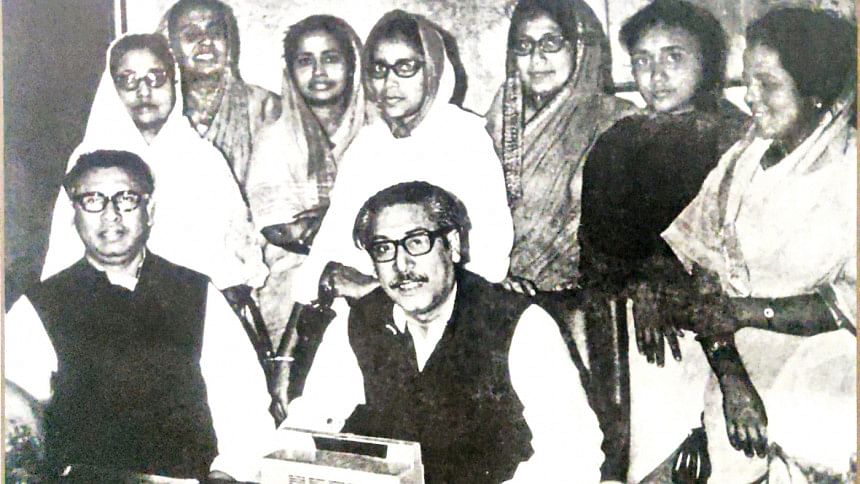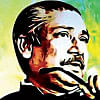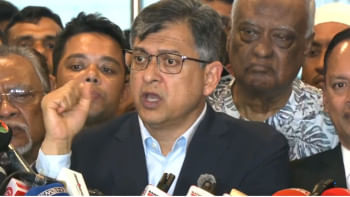‘1971 Bangladesh – With Unbound Accounts’

When Pakistan unleashed a coordinated military attack in Dhaka and Chittagong on March 25-26, 1971, there were 20,000 West Pakistani troops throughout East Pakistan. They were engaged to prevail over the unarmed but thoroughly hostile civilian population of the two main cities of the province – Dhaka and Chittagong – apart from remaining ready to fight back "5,000 East Pakistani regulars and 13,000 East Pakistani paramilitary troops, whose loyalty was 'doubtful'." This was mentioned at a meeting of the Washington Special Action Group on March 26, 1971 (FRUS, Vol XI, Doc 11).
Pakistan had accumulated a sufficient stockpile of arms and ammunition during the cold war era after signing its first bilateral security treaty in 1953 with the US, followed by becoming member of two US-led military alliances – the South East Asia Treaty Organization (SEATO) and the Baghdad Pact (later known as CENTO). Pakistan continued to be a major recipient of US military supplies and economic aid for more than a decade, and strengthened its military capability to go for an ill-conceived adventure to "liberate" the Indian-held Kashmir in 1965 using US-supplied weapons against India, violating the norm of not using those against a non-communist adversary.
The US promptly stopped the supply of arms to Pakistan and restricted economic aid. They also stopped weapons supply to India, who had been receiving US arms since 1962 on a different consideration, after the China-India border clash broke out. Ayub's war stopped far short of his desired goal as peace was restored through the UN-backed Tashkent Agreement, and the decline of Ayub as Pakistan's invincible ruler started taking shape.
After the 1965 war, with suspension of the western aid and steady fall in public expenditures, the economic condition in East Pakistan became grim. The demand for 'complete provincial autonomy', as stated in the '21-point demand' in 1954, by the united opposition of all political parties of East Bengal, called 'Jukto Front', was again brought to the forefront.
That formulation of 'complete provincial autonomy' proposed to restrict the authority of the central government within defence, foreign affairs and currency, while advocating that the rest of the state portfolio be kept under the jurisdiction of the province(s). It won overwhelmingly in the East Pakistan provincial general election in 1954. In 1966, that demand for complete provincial autonomy, by and large, was brought to the forefront by Sheikh Mujib renaming it as the 'Six-point demand'.
Earlier during 1956-63, the issue of 'complete autonomy' was sidelined by the AL when Hussain Shaheed Suhrawardi was its leader. It was only after his death in 1963 that his successor and ardent follower Sheikh Mujib included 'complete autonomy' in the AL manifesto again.
As Ayub after the debacle of the 1965 war faced a crisis in every sphere of national life, most of the opposition parties of Pakistan assembled over a round table conference (RTC) at Lahore to demand an end to 'one-man rule' and return to parliamentary democracy. Sheikh Mujib was a participant of the RTC and surprised others by presenting the 'Six-point program' for the first time on behalf of the AL. Parties representing vested interests of West Pakistan were also participants at the RTC, who disagreed with what Sheikh Mujib demanded. As a result of opposition disunity the objective of removing Ayub failed. Ayub took full advantage of the situation, tried to misguide the public by charging that the 'Six-point' was a conspiracy to break away from Pakistan and to make East Pakistan independent.
He arrested Mujib, and fabricated a case in January 1968 against him and 33 others, charging them 'for conspiracy to bring arms from India' to engineer an armed revolt and make East Pakistan free. The case was brought for public hearing in open court, Ayub allowed newspapers to publish daily court proceedings of the trial to expose Mujib's 'heinous crimes'. But his rule by then had become so unpopular that his publicity to malign Mujib made the latter the biggest political cult in the province.
By the end of January 1968, Ayub suffered a massive heart attack. The army chief General Yahya Khan took that opportunity to handle the top executive files of the state on Ayub's behalf, violating the constitutional provision of making the national assembly speaker officiate the event in the long absence of the president. As Ayub resumed his responsibilities a few months later, the post-war economic crisis had deepened in a number of areas in West Pakistan and serious labour unrests erupted, while most of the political parties united for restoration of democratic rule.
Since usual police measures failed to tackle the spread of labour unrest, Ayub attempted to deploy the army. But that could not be done without declaring a state of emergency for the country as a whole and handing over power to the army, as pointed out by Army Chief Yahya Khan. A separate plan to defuse the united move by the political parties was worked out somehow, but labour unrest continued. Yahya kept opposing army deployment without martial law cover for the whole country, and when that was promulgated on March 26, 1969, Yahya, as the head of the army, took over the state power without firing a shot.
Two months before Yahya took over, in far-away America, in January 1969, Richard Nixon of the Republican Party, became the new US President by defeating Lyndon B Johnson of the Democratic Party, in the presidential poll of November 1968. Johnson lost popular support mainly due to his involvement in the catastrophic war over Vietnam. During 1969-70, Nixon did some advance planning for pulling out the US from the Vietnam War before the next presidential election in 1972. He started to explore the possibility of improving the relationship with China by full diplomatic recognition, which was long overdue since the revolutionary birth of new China in 1949.
China, being an important ally of North Vietnam and a backer of the South Vietnam Communist Party, needed to be brought within the orbit of dialogue to find a negotiated exit from such an unpopular war. In that context, Nixon took a view that since Pakistan was occasionally used as a conduit for exchanging messages to and from China, it would be helpful to spare Pakistan from the continuing ban on supply of arms and spare-parts.
For Yahya, it was most imperative to restore the supply of US weapons and spare-parts in order to bring Pakistan's military machine back on track again, and also strengthen his personal leadership over Pakistan's armed forces. He began working on it immediately after taking over power. On March 29, 1969, only three days after taking power, he sent his talented deputy chief martial law administrator, Rear Admiral SM Ahsan, the commander-in-chief of the Pakistani Navy, to America to attend the funeral of the wife of former US President Eisenhower. Ahsan after reaching the US began lobbying for the resumption of arms supply with State Department officials and, eventually with President Nixon. The decision to resume the supply of spare-parts from the US took a concrete shape after Nixon met Yahya in Lahore in July 1969, during his fact-finding tour to Asia.
Yahya also started probing to seek cooperation with political parties at home, realising that the country could no longer be ruled relying solely on the support of the military force.
All the intelligence agencies of Pakistan kept on filing assessments that AL would be unable to get absolute majority in the national assembly to frame the constitution based on the 'Six-points' in order to shift economic and financial powers from the centre to the provinces. From the other side, Yahya was likely to be viewed differently from the usual Punjabi army officer's mould, since not only was he born and brought up in a Pushto speaking family, his sympathetic role in breaking up the Punjab dominated 'One Unit' system had not gone unnoticed.
Yahya, before allowing free election campaigning, had probably assumed that the appeal of 'Six points' being utterly provincial would alienate the vested interest of West Pakistan and make them rely on the army to safeguard their interests. Yet, he devised the ultimate safety catch against AL's 'Six points' by the 'Legal Framework Order' (LFO), an ordinance issued in July 1970. By invoking the LFO, the president could reject any constitutional proposal that would not conform to the regime's requirement for a 'strong centre'; and even the constituent assembly would be dissolved if an acceptable constitutional proposal was not produced within 120 days.
But the accumulated grievance of 23 years against West Pakistan's exploitation and injustice proved more decisive than volumes of intelligence updates as dire threats were expressed through the ordinance. The cyclone and tidal wave of November 12-13, 1970 the most catastrophic in three centuries, hammered the proverbial last nail on the coffin of united Pakistan as the official and public representatives from West Pakistan failed to turn up for the relief and rehabilitation work for the millions struggling to survive the post-disaster situation.
The general election that began on December 7 made the tally of victorious AL candidates 167 out of 313 total national assembly seats.
The election result also became a nightmare for Yahya since he promised to protect the central government's authority over the country's defence expenditure and other administrative and development commitments. Soon after the disastrous election results, Yahya asked his corps commander in East Pakistan Lt General Shahebzada Yakub Khan to prepare plans for possible contingencies that might help in the near future.
The plan was designed to meet the worst contingency arising out of any mass upsurge, and open defiance of martial law. Yahya then came to Dacca on January 12 and during the next five days, he tried his best to persuade Mujib to dilute some of the stiff conditions of 'Six- points', but failed.
From there, he went to Larkana on January 17 to talk to Z. A Bhutto, the leader of the second biggest party, Pakistan People's Party (PPP), who had won 81 seats in the National Assembly. Bhutto, as a minister in Ayub's cabinet, was an ardent supporter of the 1965 war against India, and was sacked for disagreeing on the peace deal Ayub had to sign at Tashkent. He started opposition politics on his own; his rhetoric became immensely popular among the common people in Sindh and Punjab as well as within the army. His success in the election created new followers amongst Pakistan's senior army officers who were increasingly getting nervous since the result of the general election, and particularly because Yahya still showed the tendency to concede to Sheikh Mujib's demands.
Yahya took with him his Principal Staff Officer Peerzada, Chief of Army Staff Hamid, Chief of General Staff Gul Hassan and chief of Military Intelligence Umar to go to Larkana in Sindh; and all of them by then were either virulently anti-Mujib or pro-Bhutto. All of them were aware that Yahya reached the dead end of the political road in Dhaka. It appeared that there was convergence of views between Bhutto and army commanders on the danger of secession underlying the 'Six-points' and on Yahya's incapacity to solve it. Bhutto's articulation of the dangers arising from them to the country and the army itself must have created a deep impression on the generals. Karim (Brigadier M. Iskanderul Karim) thinks that in the Larkana meeting "Bhutto made known to Yahya in a very subtle way that the army leadership was with him on the East-West issue.''
Apprehending a serious threat against his leadership spreading within the army, Yahya upon returning to Islamabad thought over the action he should take. He finally called the US ambassador Joseph Farland to his residence on January 27. Yahya informed him about the underlying breakup Pakistan was facing along the regional line in the process of current negotiation for a constitution, and asserted that he could not let it happen and would abrogate the constitution making process to preserve the territorial integrity of the country. Ambassador Farland responded positively to Yahya's decision and said: 'It was the policy of the US to respect the unity and integrity of Pakistan' (FRUS, Document 109, Volume E-7)
The implication of US policy to 'respect the unity and integrity of Pakistan' needs a little bit of clarification. The US was not expected to participate in the acts of preventing militarily the break-up of East and West Pakistan, but it was clear that Pakistan would use every resource at his disposal, including US supplied arsenal as 80 per cent of Pakistan's stocks were sourced from the US. As Gary J Bass, the author of 'The Blood Telegram – India's Secret War in East Pakistan' mentioned: "The on-going assault required a formidable amount of military resources, including perhaps four Pakistan army divisions equipped with armour, as well as the Pakistan Air Force. In this Pakistan was relying on lots of U.S. weaponry and equipment – everything from ammunition and the spare parts that keep armed forces operating, to major items like tanks and massive C-130 transport airplanes that shuttled soldiers from West Pakistan to East Pakistan. As the crackdown began, Bengalis begged US diplomats not to allow American-supplied weapons to be used for 'mass murder'. The Nixon administration made no move against Pakistan's use of US weaponry." (Garry J. Bass, pg 57) During the cold war era, there was no restriction on the use of American weapons received under defence treaties against aggression from a communist country. Those could also be used in civil strife conditions, to combat internal subversion by pro-communist organisations. Possible use of US supplied weapons in East Pakistan as viewed at the end of January,1971 was clearly none of those two.
Muyeedul Hasan was a special assistant to Tajuddin Ahmad, the Prime Minister of the Bangladesh Government-in-exile. He is also the author of Muldhara `71 and Upadhara 71, March-April.
This is an abridged version of the first chapter of the upcoming book titled 1971 Bangladesh – With Unbound Accounts.

 For all latest news, follow The Daily Star's Google News channel.
For all latest news, follow The Daily Star's Google News channel. 






Comments